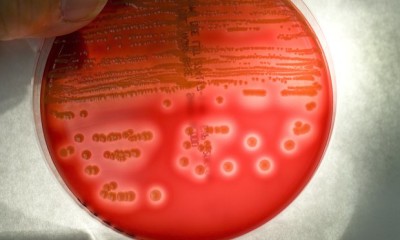
In 1928, as Alexander Fleming was sorting through a pile of petri dishes that he’d been cultivating bacteria in, he noticed something unusual. Mold growing in one of the dishes had created a bacteria-free circle around itself. After taking samples of the mold he found it belonged to the penicillium family. Fleming had accidentally stumbled across penicillin, the first antibiotic.
Although Fleming published a paper on the new discovery, it was largely ignored until the 1940s and the onset of World War II. With positive tests in mice and humans showing the true power of penicillin, the US government actively pushed industry into the mass production of the drug. By the end of the war, U.S. companies were making more than 650 billion units a month, which saved tens of thousands of lives then and millions since.
Today marks 61 years since the death of Fleming, and his discovery is still hailed as one of the greatest in medical history. However, we are now facing the prospect of this progress being undone, with the emerging crisis of new strains of antimicrobial resistant bacteria effectively nullifying existing antibiotics. We are on the road back to the days of people dying from common infections and injuries.
According to a study conducted in the UK, following direct intervention by the Prime Minister David Cameron, if we fail to find effective antibiotics and manufacture them at the scale needed, ten million people a year across the world will die by 2050. This would make antimicrobial resistance the world’s single biggest killer. The loss to global GDP will be $100 trillion (more than the whole global economy put together).
In November 2015, scientists declared that they had discovered bacteria resistant to the antibiotic of last resort, colistin. Furthermore, the resistant gene was found to transfer between bacteria strains, meaning many types of infection could quickly become untreatable.
The alarm is still ringing around the world but with coordinated action between government, industry, civil society and the public at the international, national and local levels, we can still turn the tide against antimicrobial resistance.
At the national level, governments are starting to take action. Obama, Cameron and Modi have all made personal statements about the need for action against antimicrobial resistance. The UK government has committed $300 million to support microbiology surveillance capacity in developing countries. G-7 and G-20 leaders have committed to take action and at the World Economic Forum in Davos, more than 80 companies committed to develop sustainable markets for antibiotics and to reinvigorate the basic scientific research and development needed to create a new generation of lifesaving drugs.
Action at the local level involves simple hand washing and immunization campaigns to stop the spread of infections in the first place. Thanks to public pressure, the food industry has also started to take action to reduce the misuse of antibiotics in agriculture. Civil society has a critical role to play both raising attention about how to avoid infection and to educate patients about the proper use of antibiotics, including when to take them and the importance of taking the full course of treatment.
Misuse is a global problem: in many countries, antibiotics are available over the counter at pharmacies, often in part because some areas don’t have enough doctors to responsibly prescribe antibiotics to those who need them. A new study published in PLOS found that lack of access to effective and affordable antibiotics still kills more children in India than drug resistance. If we don’t change the approach that has led us down this dark path, then any new antibiotics found will simply delay the problem.
Gonorrhoea could become untreatable, says chief medic
Read more
This month, the United Nations Secretary-General’s High-Level Panel on Access to Medicine is holding global meetings in London and Johannesburg to discuss new ideas, thoughts and innovative ways that governments, civil society, pharmaceutical groups, human rights lawyers and academia can help both promote innovation and increase access to vaccines, diagnostics and medicines. The antimicrobial resistance crisis gives added urgency to the development of the Panel’s report, which will be released in June.
Last year we saw a breakthrough: entirely new antibiotics were discovered for the first time in almost thirty years. To develop approximately 15 new drugs would cost $16-35 billion over the next ten years, which pales in significance to the estimated $100 trillion decrease in lost global economic output if we do not take action now.
Between the 20 richest countries and the major pharmaceutical companies there is no excuse for not finding the money needed (approximately $2 billion per year) to tackle the crisis. The return on investment makes it the right economic decision.
Unlike Fleming in 1928, we know how important antibiotics are and what is needed to protect the world from a doomsday scenario. We have all the information at hand to make critical policy changes. Drug resistance is not a theoretical threat that we should probably do something about. The science is clear: the threat is real and immediate. Now action must follow.
Mandeep Dhaliwal is Head of the Secretariat of the United Nations Secretary-General’s High-Level Panel on Access to Medicine and the Director of Health and HIV at UNDP.
END

Be the first to comment